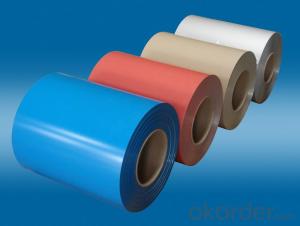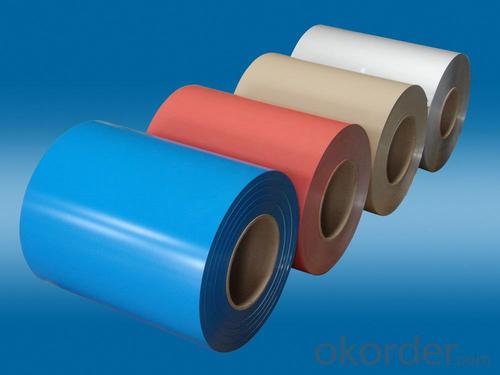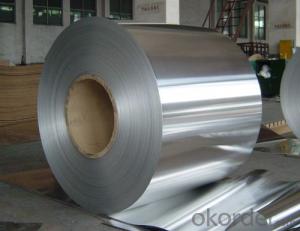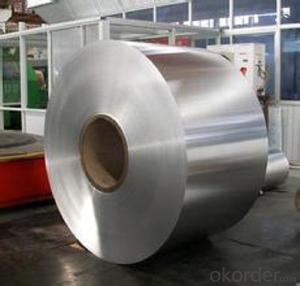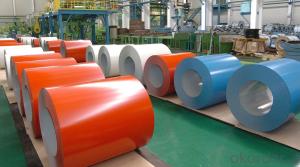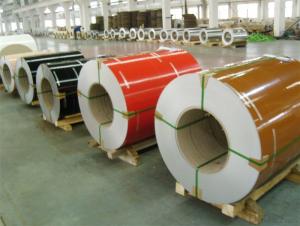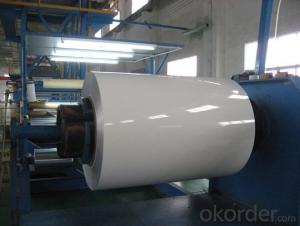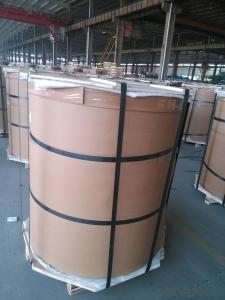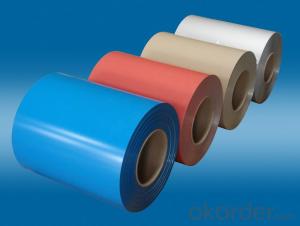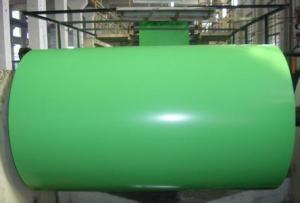Aluminum Coil 3003 AA1050 Prepainted Aluminium Coils Used for Construction
- Loading Port:
- Shanghai
- Payment Terms:
- TT OR LC
- Min Order Qty:
- 3 m.t.
- Supply Capability:
- 10000 m.t./month
OKorder Service Pledge
OKorder Financial Service
You Might Also Like
Specification
1.Structure of AA1050 Prepainted Aluminium Coils Used for Construction Description
AA1050 Prepainted Aluminium Coils Used for Construction are widly used in decoration field. For the painting, it depends on the using evironment. If you use in the open air, we recommend the PVDF coated aluminium coils. This kind of painting can last 15-20 years. If you use in the room, we recommend PE coated aluminium coils. The price is much more competitive.
Direct Continuous Aluminium Foil Stock in Coil is one semi-finished aluminium material. This strip can be rolled down to aluminium foil.The final thickess can be 5-20 microns. Aluminium foil is soft, ductile and with a silver-white luster which can be widely used in a large scare of fields.
2.Main Features ofAA1050 Prepainted Aluminium Coils Used for Construction
• Superior quality of raw material
• Reasonable and stable chemical composition
• Accurate tolerance
• Goode mechanical property
3.AA1060 Prepainted Aluminium Coils Used for Construction Images
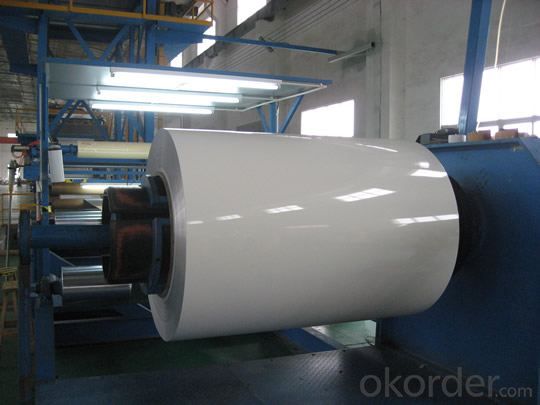
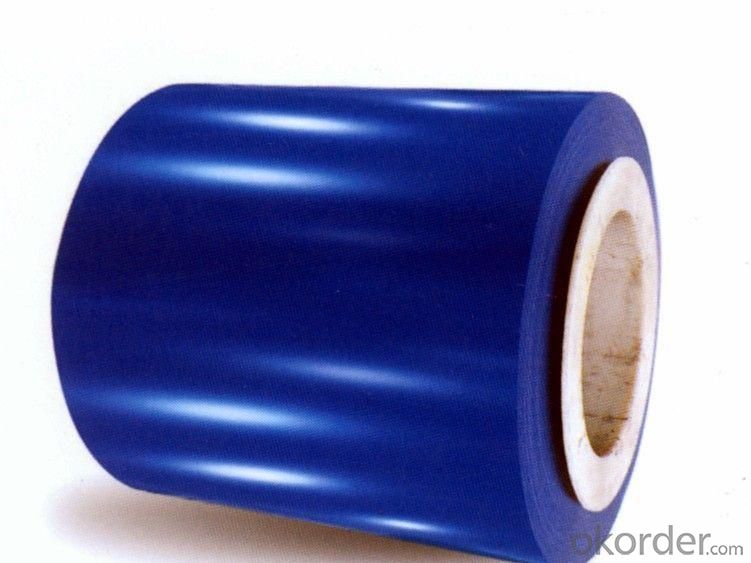
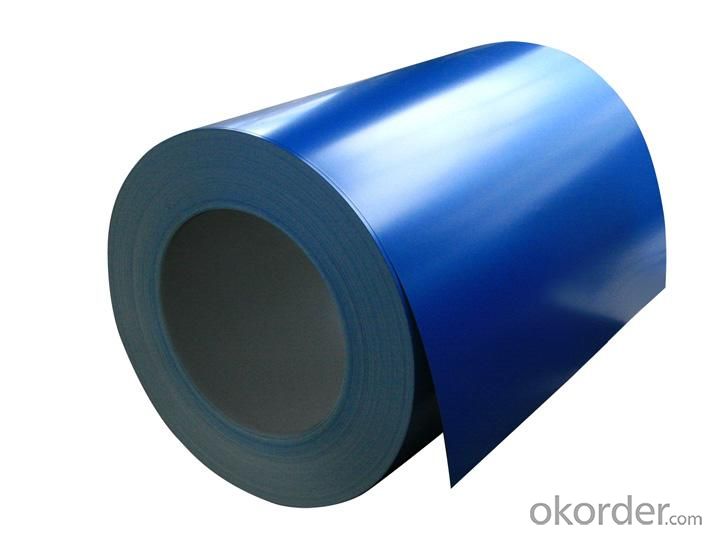
4.AA1050 Prepainted Aluminium Coils Used for Construction Specification
Alloy | AA1050 |
Temper | H14,H16,H18,H22,H24,H26,H32,O/F |
Thickness | 0.03mm-3.0mm |
Width | 30mm-1700mm |
Coating | PE,PVDF,Epoxy |
Painting Thickness | Standard 16-25 Mic, max 40 Mic |
Color | According to RAL colors or customers' samples |
Standard | GB/T 17748-1999 |
5.FAQ:
What is the quality standard?
---Usually our standard is GB3880-2006
What is the largest width?
---It is 2000mm
What is the MOQ?
---Usually we can accept 80 tons.
- Q: What are the potential applications of painted aluminum coils?
- Painted aluminum coils have a wide range of potential applications due to their durability, versatility, and aesthetic appeal. One of the most common applications is in the construction industry, where painted aluminum coils are used for roofing and siding materials. The painted coating enhances the longevity of the aluminum by providing protection against corrosion, UV rays, and harsh weather conditions. Additionally, painted aluminum coils find applications in the manufacturing of transportation vehicles. The lightweight nature of aluminum makes it an ideal material for automotive parts, such as body panels and trim. The painted coating not only enhances the appearance of the vehicle but also provides a protective layer against scratches and dents. Another potential application of painted aluminum coils is in the production of household appliances. The painted coating adds a distinct finish to appliances like refrigerators, ovens, and washing machines, making them more visually appealing. Moreover, the protective layer helps to prevent damage from everyday use, increasing the lifespan of the appliances. Furthermore, painted aluminum coils find use in the signage industry. The ability to apply vibrant colors and designs on the coils makes them suitable for creating eye-catching signs and billboards. The durability of the painted coating ensures that the signage remains vibrant and intact even in outdoor environments. In the furniture industry, painted aluminum coils can be used for manufacturing various pieces such as chairs, tables, and cabinets. The lightweight nature of aluminum makes the furniture easy to move and transport, while the painted coating adds a stylish and modern touch to the designs. Overall, the potential applications of painted aluminum coils are vast and diverse, ranging from construction and automotive to appliances, signage, and furniture. The combination of durability, versatility, and aesthetic appeal makes painted aluminum coils a popular choice in various industries.
- Q: Are aluminum coils suitable for pharmaceutical packaging?
- Pharmaceutical packaging finds aluminum coils to be a fitting option. The pharmaceutical industry extensively utilizes aluminum due to its remarkable qualities of offering a barrier, durability, and flexibility. It effectively safeguards against moisture, light, oxygen, and other external elements that may compromise the quality and stability of pharmaceutical products. Aluminum coils allow for effortless molding into diverse shapes and sizes, making them ideal for packaging various pharmaceutical products like tablets, capsules, and ampoules. The packaging can be tailored to specific requirements, ensuring proper sealing and protection during storage and transportation. Moreover, aluminum is both non-toxic and chemically inert, guaranteeing that it does not react with the contents of the package. This is crucial for maintaining the medication's integrity and safety. Additionally, aluminum coils possess excellent heat conductivity, rendering them suitable for the commonly employed heat-sealing processes in pharmaceutical packaging. Apart from their functional properties, aluminum coils offer a sustainable and environmentally friendly choice for pharmaceutical packaging. They are easily recyclable, reducing the environmental impact and promoting sustainability within the healthcare industry. In summary, the barrier properties, flexibility, customization options, non-reactivity, heat conductivity, and sustainability of aluminum coils make them highly appropriate for pharmaceutical packaging.
- Q: How do aluminum coils contribute to the durability of roofs and facades?
- Aluminum coils contribute to the durability of roofs and facades due to their inherent properties. Aluminum is a strong and corrosion-resistant material, making it highly resistant to weathering, rust, and decay. This resistance to corrosion helps prevent the formation of leaks and structural damage, increasing the lifespan of roofs and facades. Additionally, aluminum coils are lightweight yet sturdy, providing structural integrity without adding excessive weight to the building. This feature reduces stress on the overall structure and ensures better performance against various environmental factors, including wind, snow, and seismic activities. Overall, aluminum coils play a vital role in enhancing the durability and longevity of roofs and facades.
- Q: Can aluminum coils be used in agricultural applications?
- Yes, aluminum coils can be used in agricultural applications. Aluminum is a versatile and lightweight material that offers several benefits for agricultural purposes. Aluminum coils are commonly used in various agricultural equipment and structures, such as greenhouse frames, irrigation systems, and grain storage bins. One of the main advantages of using aluminum coils in agricultural applications is their resistance to corrosion. Aluminum is naturally resistant to rust and can withstand exposure to moisture, chemicals, and other elements commonly found in agricultural environments. This makes it a durable and long-lasting choice for agricultural equipment that needs to withstand harsh conditions. Additionally, aluminum coils have excellent thermal conductivity, meaning they can efficiently transfer heat. This property makes aluminum coils suitable for applications such as heat exchangers, which are often used in agricultural machinery like tractors and combine harvesters. Efficient heat transfer helps in maintaining optimal operating temperatures and improving overall equipment performance. Moreover, aluminum coils are lightweight, which makes them easy to handle and transport. This is particularly advantageous in agricultural applications where equipment needs to be moved frequently, such as portable irrigation systems or lightweight structures. The lightweight nature of aluminum also helps reduce fuel consumption in machinery, leading to cost savings and environmental benefits. Furthermore, aluminum is a non-toxic material, making it safe to use in agricultural applications. It does not release any harmful chemicals or leach into the soil, ensuring that crops remain uncontaminated and safe for consumption. In summary, aluminum coils can indeed be used in agricultural applications due to their corrosion resistance, thermal conductivity, lightweight nature, and non-toxic properties. These qualities make aluminum a reliable and efficient choice for various agricultural equipment and structures, contributing to increased productivity and sustainability in the agricultural industry.
- Q: What are the different grades of aluminum used in coils?
- Coils utilize various grades of aluminum, each boasting unique properties and applications. Notable grades encompass: 1. The 1000 series, a commercially pure aluminum, excels in fighting corrosion. It finds its niche in chemical processing devices and marine components, where corrosion resistance reigns supreme. 2. The 3000 series alloys shine with moderate strength and impressive formability. Their versatility sees them employed in cooking utensils, heat exchangers, and general sheet metal fabrication. 3. The 5000 series grade impresses with its weldability and corrosion resistance. Marine settings, transportation, and structural components all benefit from its presence. 4. The 6000 series alloys blend strength, formability, and corrosion resistance. As a result, they abound in architectural applications - window frames, doors, and curtain walls. 5. The 7000 series grade touts high strength and toughness. It's a favorite contender within aerospace, sporting goods, and automotive realms, where robustness is paramount. These examples merely scratch the surface of the aluminum grades employed in coils. Selecting the appropriate grade hinges on application-specific criteria like strength, corrosion resistance, formability, and weldability.
- Q: What are some common applications for aluminum coils?
- Due to their exceptional qualities and versatility, aluminum coils find widespread use in various industries. They are particularly utilized in: 1. Construction: The construction industry extensively employs aluminum coils for roofing, cladding, and insulation purposes. Their lightweight nature makes them ideal for reducing overall structure weight and providing excellent corrosion resistance. 2. Transportation: The automotive and aerospace industries widely utilize aluminum coils. In the automotive sector, they are employed in the manufacturing of heat exchangers, radiators, and condensers, as well as lightweight body panels, improving fuel efficiency. In the aerospace industry, aluminum coils are used to manufacture aircraft parts with a high strength-to-weight ratio, such as wings, fuselages, and engine components. 3. Electrical and Electronics: The electrical and electronics industry employs aluminum coils in various applications. They are commonly used in the production of transformers, motors, and generators due to their excellent conductivity and lightweight nature. Aluminum coils also find use in electrical cable manufacturing, as they offer good electrical conductivity and resistance to corrosion. 4. Packaging: The packaging industry extensively uses aluminum coils due to their excellent barrier properties. They are commonly employed for packaging food and beverages, pharmaceuticals, and other consumer products. Aluminum coils provide an impermeable barrier against moisture, oxygen, and light, ensuring the preservation and protection of packaged goods. 5. Heating, Ventilation, and Air Conditioning (HVAC): Aluminum coils are widely integrated into HVAC systems for their excellent heat transfer properties. They are commonly found in air conditioning systems, heat pumps, and refrigeration units. Aluminum coils facilitate efficient heat exchange, ensuring effective cooling and heating processes. In conclusion, aluminum coils are widely employed in the construction, transportation, electrical and electronics, packaging, and HVAC industries. Their lightweight nature, corrosion resistance, excellent conductivity, and heat transfer properties make them highly versatile and valuable in these sectors.
- Q: What are the common surface defects or issues in aluminum coils?
- Aluminum coils may exhibit various surface defects or issues that can arise from different causes. These defects can have detrimental effects on the appearance, quality, and functionality of the coils. Therefore, it is crucial for manufacturers and users to be mindful of these defects and implement necessary measures to prevent or reduce their occurrence. Scratches, for instance, are visible marks on the coil surface that result from contact with abrasive materials or mishandling during production, transportation, or storage. Streaks, on the other hand, manifest as long, narrow lines or bands on the coil surface, often caused by irregularities in the rolling process or impurities present in the aluminum material. Dents are localized depressions or deformations that can occur due to mishandling, accidental impacts, or improper storage practices. Corrosion, though aluminum is generally resistant, can arise from specific environmental conditions or exposure to corrosive agents, leading to the formation of oxide layers or pitting on the coil surface. Edge cracks refer to fissures that appear along the coil edges, resulting from improper cutting or shearing during manufacturing. Surface roughness, characterized by an uneven or bumpy texture, can arise from inadequate smoothing or finishing during rolling or processing. Oil stains may be observed as dark or discolored areas on the coil surface, caused by improper cleaning or lubrication during production. Coil set refers to the coil's tendency to retain a curvature or shape after unwinding, resulting from stresses induced during rolling, coiling, or cooling, leading to an uneven and non-flat surface. Roll marks are patterns or imprints left on the coil surface by the rolling mill or equipment, caused by uneven pressure or improper tool alignment. Discoloration, characterized by changes in color or appearance, can result from exposure to high temperatures, chemical reactions, or oxidation. It is essential to recognize these surface defects and their potential impact on the quality and performance of aluminum coils. By taking appropriate preventive measures, manufacturers and users can minimize these defects and ensure the desired appearance and functionality of the coils.
- Q: Are aluminum coils resistant to oil and grease?
- Aluminum coils typically possess resistance against oil and grease. They exhibit a natural ability to resist corrosion and are not easily influenced by most solvents, including oil and grease. This characteristic renders aluminum coils a suitable option for diverse applications that involve potential contact with oils or greases, such as the automotive and HVAC sectors. Nevertheless, it is crucial to acknowledge that extended exposure to particular aggressive chemicals or high concentrations of oil or grease may gradually result in damage or deterioration of the aluminum coils. Consequently, it is advisable to diligently clean and maintain the coils to guarantee their optimal functioning and durability.
- Q: Roll presented above 1 complete circles are brineling put on work roll after the new rolling, less than 12 volumes in the aluminum surface will be presented in the corresponding position of a straight roller, a roller indentation in the above, check the work roll above a pit. Replace the upper support roll for only a few days. Want to know what's going on?Should not be bearing problems, because the bearings have been used for almost 4 years, it should not be bearing problems, and now they are suspected of bending cylinder seal problems, oil seepage phenomenon.
- For a few days and roll crushed?Whether or not the work roll tilt and the positive and negative camber of the roll are controlled, the work roll is running abnormally, and the backup roller is rubbed.
- Q: Explain the differences between aluminum coils and iron coils, including their properties and applications.
- <p>Aluminum coils and iron coils differ in material composition, weight, strength, and applications. Aluminum coils are made of aluminum, a lightweight, corrosion-resistant metal, while iron coils are made from iron, which is heavier and more prone to rust. Aluminum coils have a lower density, making them ideal for applications where weight is a concern, such as in construction or automotive industries. They also have excellent electrical and thermal conductivity. Iron coils, on the other hand, are stronger and more durable, making them suitable for heavy-duty applications like construction reinforcement and machinery parts. Iron is also magnetic, which is an advantage in certain applications. However, iron is more susceptible to corrosion and requires protective coatings or treatments to extend its lifespan.</p>
Send your message to us
Aluminum Coil 3003 AA1050 Prepainted Aluminium Coils Used for Construction
- Loading Port:
- Shanghai
- Payment Terms:
- TT OR LC
- Min Order Qty:
- 3 m.t.
- Supply Capability:
- 10000 m.t./month
OKorder Service Pledge
OKorder Financial Service
Similar products
Hot products
Hot Searches
Related keywords
